Archive
02 July 2018
Subsidy for making the ‘smartest part of the North Sea’
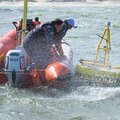
An advanced test area of 10 x 10 nautical miles (= about 185 football pitches) is planned for off the coast of The Hague, just outside the port of Scheveningen. This area is unique in the world. It is within this ‘smartest stretch of the North Sea’ that the likes of Delft Data Science (DDS) researchers Anna Vilanova and Elmar Eisemann will get the chance to further their research.
27 June 2018
QuTech’s Menno Veldhorst named to MIT Technology Review’s 2018 Innovators Under 35 List
Menno Veldhorst has been named to MIT Technology Review’s prestigious annual list of Innovators Under 35. Menno Veldhorst has invented a faster path to real-world quantum circuits by making it possible for them to be printed on silicon—the way computer chips have been printed for decades. Prior to Veldhorst’s innovation, it was considered impossible to make usable, semiconductor-based quantum circuits on silicon that would be stable enough to perform useful calculations.
25 June 2018
Bacteria as living factories for the production of powerful antibiotics
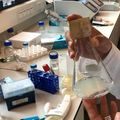
By definition, antibiotics kill bacteria. Nevertheless, TU Delft researchers have succeeded in engineering bacteria to produce promising amounts of a simple carbapenem antibiotic. Carbapenem antibiotics are effective against many bacteria and are usually only used when other antibiotics fail. They are currently only produced synthetically – an expensive process that also leads to chemical waste. This research suggests that by using bacteria as ‘living factories’, carbapenems might also be produced biologically.
13 June 2018
Delft scientists make first ‘on demand’ entanglement link
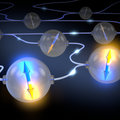
Researchers at QuTech in Delft have succeeded in generating quantum entanglement between two quantum chips faster than the entanglement is lost. Entanglement - once referred to by Einstein as "spooky action" - forms the link that will provide a future quantum internet its power and fundamental security.
07 June 2018
Marcel Ottens’ group to participate in new International Training Network

As part of a large European biopharmaceutical consortium, the research group of Marcel Ottens will participate in a 4M€ Marie Curie International Training Network (ITN).
01 June 2018
Five Vidi grants for TU Delft: from zig-zagging through computational barriers to clay-like orthopaedic implants
The Netherlands Organization for Scientific Research (NWO) has awarded Vidi grants worth EUR 800,000 to five researchers at TU Delft. A Vidi grant enables them to set up their own research group to develop their own innovative line of research.
28 May 2018
Bacteriophages

What is invisible and will kill millions of people in thirty years' time? Answer: bacteria. Years of excessive use of antibiotics have enabled certain bacteria to evolve in a way that has become impossible to treat. A small group of researchers at TU Delft is working hard to find a solution.
25 May 2018
e-Refinery initiative launched
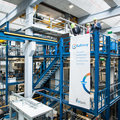
On Tuesday 22 May the Process & Energy lab was filled to the brim with e-Refinery. This brand-new consortium will help to electrify and decarbonise the chemical and energy industries with its unique integrated approach, ranging from materials to processes and their upscaling.
24 May 2018
Jack Pronk receives two awards
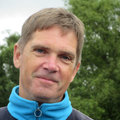
The past weeks, Jack Pronk received two prizes. He was awarded the International Metabolic Engineering Award by the International Metabolic Engineering Society. In addition, he received the ‘Zilveren Zandloper’ (Silver Hourglass), an educational prize, during the Dutch Biotechnological Congress 2018 on 22 May.
26 April 2018
Cas3: a biological fishing rod and a shredder rolled into one
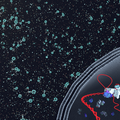
CRISPR-Cas9 has made gene editing a lot easier and will eventually help us erase hereditary diseases from our DNA.